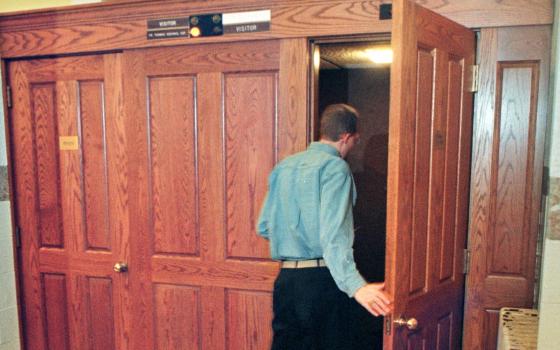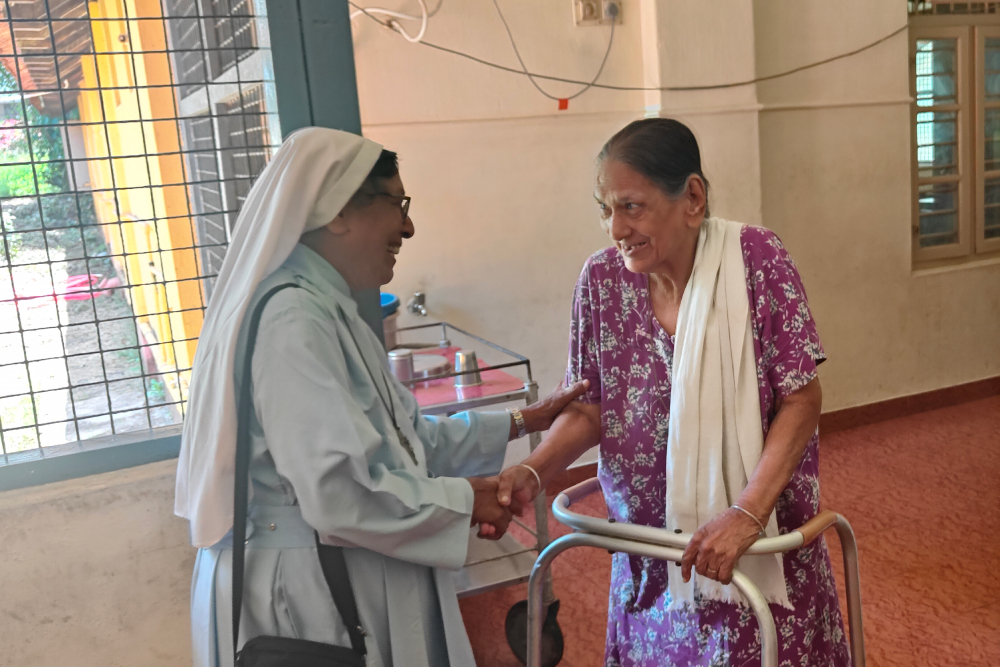
Queen of the Apostles Sr. Melania D'Souza comforts a senior citizen in the palliative care unit of Goretti Hospital in Udupi, a coastal town in the southwestern Indian state of Karnataka. (Thomas Scaria)
Sr. Melania D'Souza was intrigued when several people with symptoms of jaundice and diarrhea arrived at the hospital where she worked.
It led the Missionary Sisters of the Queen of the Apostles nun to pay a visit to Nejar, the village the patients were from, near the temple town of Udupi in the southwestern Indian state of Karnataka.
That was 40 years ago.
Since then, Nejar has transformed from a squalid village to a role model for village development and women empowerment.
The Karnataka government's Women and Child Welfare Department sent its officers to study a women's group there to replicate their success in other places. The National Bank for Agriculture and Rural Development in 1989 also sent its researchers to study the Nejar women development. Social work colleges in Karnataka have incorporated the Nejar model as study material, sending students to the village to experience community development firsthand.
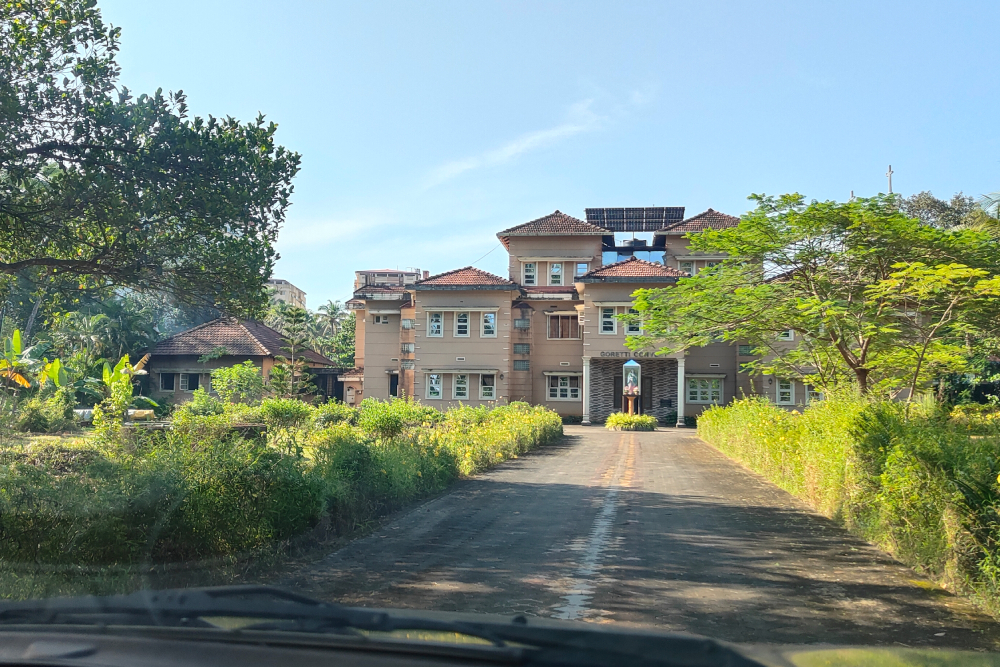
Queen of the Apostles' convent in Goretti, from where Sr. Melania D'Souza has served in the prison ministry for the past 11 years. She was in the same convent when she started the Nejar women's project 40 years ago. (Thomas Scaria)
D'Souza, a cancer survivor who recently celebrated her 75th birthday, said her first visit to Nejar was shocking. She found its residents, mostly daily wagers, living on an encroached government land with no proper houses or water sources. They used contaminated rain water.
The visit inspired D'Souza, an accountant of Goretti Hospital, to become a social worker at a time society expected Catholic nuns to provide only charity and healing, she told Global Sisters Report.
"I invited a few women in the village to an evening meeting under a banyan tree to discuss their water issue," she said.
After a year, such meetings led to the formation of "Mahila Coolie Karmika Sangha, Nejar" (Women Coolie Workers' Trade Union), the first registered body of its kind in Karnataka.
"Everything started with the struggle for drinking water," D'Souza said.
The women appealed to the then-chief minister of Karnataka for clean water. He ordered the district collector to dig tubewells in Nejar in three days.
A group of 45 women also met the state minister to demand a fresh water supply. The state minister ordered his department to build a large water tank and install eight taps in different parts of the village.
The success of meeting their water demands helped unite the women, who then worked to address other village issues such as education, land ownership, homelessness, alcoholism and exploitation by their employers, according to Gulabi Sundar, the only woman still living of the first women's group, who spoke to GSR on an Oct. 14 visit to Nejar with D'Souza.
"All my companions have passed away, but children now enjoy better education, dignity and living standard[s] because of our efforts," she said.
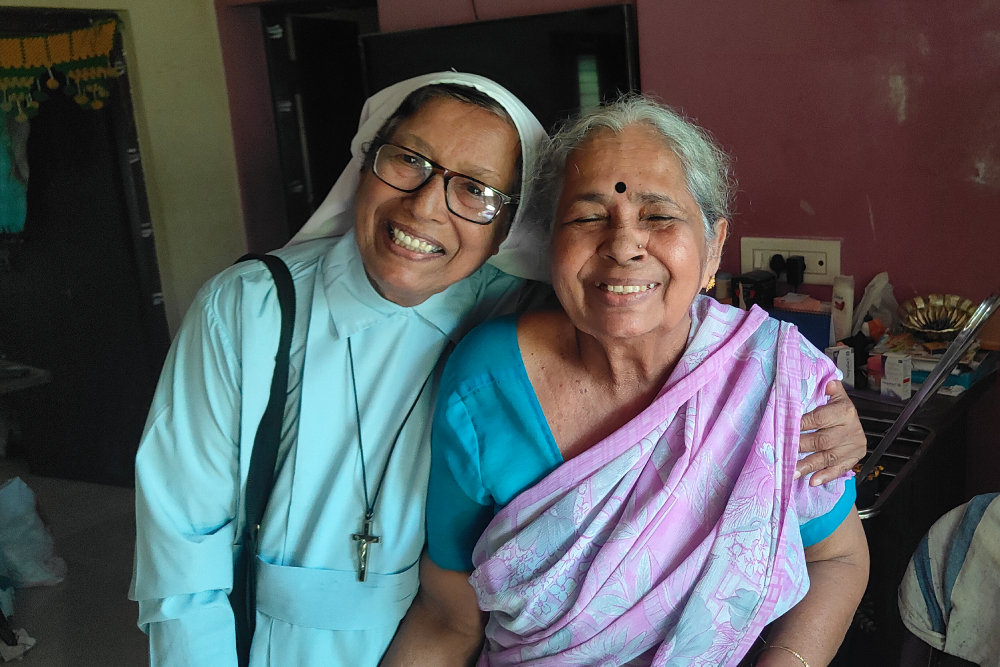
Sr. Melania D'Souza embraces Gulabi Sundar, the only living member of the initial women's group in Nejar. (Thomas Scaria)
Most of the residents in Nejar, Sundar said, were illiterate women from poor families, but they became powerful warriors for justice and dignity, guided by D'Souza.
"Individually, we were powerless, but collectively we raised our voice and got our work done," she said.
Nejar had around 180 Dalits — people formerly known as "untouchables" once at the bottom of India's caste system — and tribal families with 1,500 residents, including around 800 women.
"I firmly believed in the women's ability to shape their destiny if I inculcated in them hope and determination," said D'Souza.
D'Souza formed a core team to implement her strategies, which helped develop bylaws for the village. She taught the women to analyze their problems and collectively find ways to solve them.
The group had no building, money or assets except for the women's strong will, said D'Souza. The women met on Sundays on the road under the open sky. "When many NGOs depended on external funds, I trusted only in my people's power and resources," D'Souza said.
The women used their collective power to obtain "patta," or government documents on land ownership, and government funds to build houses, toilets and electricity connections.
Sundar said they attended D'Souza's 30-day adult education classes that taught them to write and read words related to their daily use. They also undertook educational tours and conducted cultural and sports competitions, besides celebrating Hindu, Christian and Muslim festivals.
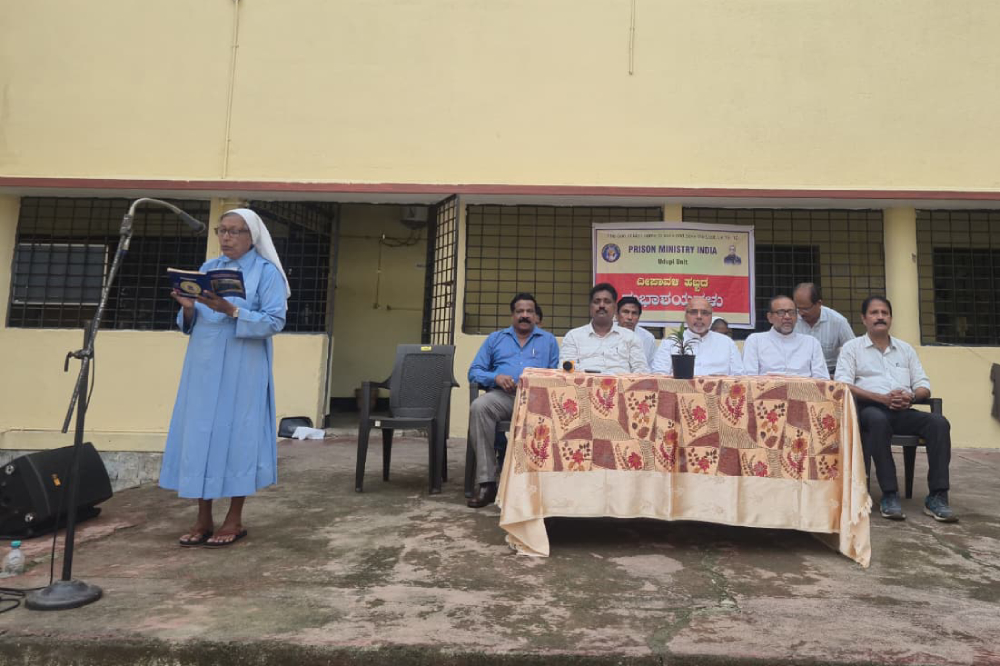
Queen of the Apostles Sr. Melania D'Souza addresses a meeting of the Prison Ministry India unit of the Diocese of Udupi in Karnataka state, southwestern India. (Courtesy of Melania D'Souza)
"In five years, the Nejar community became vibrant, empowered and a symbol of hope and enthusiasm," said the nun, who adapted the same strategy in other ministries after leaving Nejar in 1992. She said she had prepared the Nejar women to accept her possible transfer and sustain themselves.
She later worked among prisoners, migrants, HIV-affected persons and people struggling with alcoholism.
D'Souza won many awards from government and public institutions for her model of empowerment. The Karnataka government promoted Nejar-type organizations as the foundation for women's development that eventually led to the formation of self-help groups.
Recognizing her success, the United Nations invited D'Souza to the international women's conference at its headquarters in Vienna in 1995.
After Nejar, D'Souza opened a treatment center for alcoholics in Goretti Hospital in Udupi that has treated and rehabilitated more than 1,000 patients.
She also worked in six fishing villages at Honnavar, a coastal town under the Karwar Diocese.
"Working in those villages was more challenging as both men and women drank alcohol and seldom sent their children to school," she said.
"Along with women's groups, I formed children's clubs, and slowly motivated them to send their children to local government schools," she added.
For the next eight years, D'Souza helped the fisherpeople break out of their debt traps and overcome alcoholism. She also helped many build houses.
Advertisement
"There too, I did not give them money, but helped them get government aid," D'Souza said. "Charity brings dependency and will never make people self-reliant."
In Khanapur, a tribal region closer to Maharashtra, D'Souza worked for eight years from 1998, to develop a program for the HIV-affected women. It won her an award from the state health ministry.
While serving Belgaum and Karwar Dioceses in later years, D'Souza encouraged many women to study and find jobs.
D'Souza said her main challenge was convincing her congregation to allow this type of ministry.
"For them, I was engaged in a risky job with alcoholics, bonded laborers, and HIV-affected people in remote villages and at odd times," she said.
She said her people were available only in the evening or early morning since they worked during the day. "So, sometimes, I had to miss my morning and evening prayers," she added.
Sr. Elvina Alvares, the superior of the Goretti convent near Nejar, said the congregation was "only worried about her safety and security at times."
Alvares said the parts of the congregation working in other parts of India have adopted D'Souza's Nejar model.
"She has proved women and communities can develop themselves if proper guidance is provided," she said.




